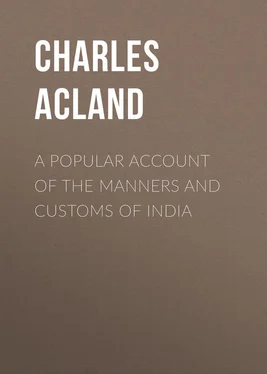Charles Acland - A Popular Account of the Manners and Customs of India
Здесь есть возможность читать онлайн «Charles Acland - A Popular Account of the Manners and Customs of India» — ознакомительный отрывок электронной книги совершенно бесплатно, а после прочтения отрывка купить полную версию. В некоторых случаях можно слушать аудио, скачать через торрент в формате fb2 и присутствует краткое содержание. Жанр: foreign_antique, foreign_prose, Путешествия и география, на английском языке. Описание произведения, (предисловие) а так же отзывы посетителей доступны на портале библиотеки ЛибКат.
- Название:A Popular Account of the Manners and Customs of India
- Автор:
- Жанр:
- Год:неизвестен
- ISBN:нет данных
- Рейтинг книги:5 / 5. Голосов: 1
-
Избранное:Добавить в избранное
- Отзывы:
-
Ваша оценка:
- 100
- 1
- 2
- 3
- 4
- 5
A Popular Account of the Manners and Customs of India: краткое содержание, описание и аннотация
Предлагаем к чтению аннотацию, описание, краткое содержание или предисловие (зависит от того, что написал сам автор книги «A Popular Account of the Manners and Customs of India»). Если вы не нашли необходимую информацию о книге — напишите в комментариях, мы постараемся отыскать её.
A Popular Account of the Manners and Customs of India — читать онлайн ознакомительный отрывок
Ниже представлен текст книги, разбитый по страницам. Система сохранения места последней прочитанной страницы, позволяет с удобством читать онлайн бесплатно книгу «A Popular Account of the Manners and Customs of India», без необходимости каждый раз заново искать на чём Вы остановились. Поставьте закладку, и сможете в любой момент перейти на страницу, на которой закончили чтение.
Интервал:
Закладка:
I think I have described to you the graceful appearance of the bamboo-tree, but it is its extreme usefulness that renders it so precious. It is a sort of hollow strong cane, and serves for the upright posts at the corners of the native houses and also for the door-posts. To our own bungalows or thatched houses it forms the rafters to support the thatch; it is used for scaffolding and for ladders without any shaping or preparing. One joint of it makes a very good bottle; a long piece of it, with one side cut off and the stoppage at the joints cut away, makes a waterspout or watercourse, or a thing for fowls to eat or drink out of. In short, it would be tedious to enumerate the many uses to which it is put.
I had the other day an instance of the extent to which servants carry the system of doing each his own work and no one's else. I had been feeding the parrots with a little rice and had spilt a few grains of it upon the table. I called the barah, or furniture-cleaner: he said it was the parrot's food, and therefore it was the waiter's business to clean it up. I told him to do as he was bid, but he would not, and then I said that if he did not I should discharge him with a character for disobedience; this he preferred to doing what he considered was not his own work, so I sent him away at once.
None of my servants can speak a word of English, and I am sometimes rather at a loss on this account; but I always keep a dictionary on the table, and I am rapidly acquiring a knowledge of the Hindustanee language. There are no shops that Europeans can go to, except at Calcutta. In the country, which is called the Mofussil, a sort of pedlers come round with goods. I offer them generally one-third of the price they name, and they in most cases take it. The other day, my wife was making up her accounts, and asked the kitmajar how much he had given for a certain article; the man said, "Three rupees." My wife replied that she did not think he had given so much; he answered, "Yes, three rupees." She said, "Now, I don't believe you gave more than two rupees;" to which his answer was, "Yes, I gave two rupees." Still she did not credit him, and said, "Now, I am sure you only gave one rupee;" and he replied, "Yes, one rupee." And he was quite satisfied: and all this time he answered as calmly as possible, and did not appear in the least ashamed; and yet this man is one who is considered a very good servant, and whom I believe to be as honest as any one I have.
November 12
Last night, a little before ten o'clock, my wife was gone to bed, and I was sitting up reading and writing. In this country, you may know, the servants at each house, instead of having a clock, strike a gong at every hour. It is a flat circular plate of bell-metal, which, when struck with a wooden mallet, gives forth a very loud ringing sound. Just before the gong struck ten, I heard a noise like that of a buggy (or gig with a large head to it to keep the sun off) approaching. 2 2 It is the most common sort of carriage in India.
I thought to myself, "Why, there must be a party somewhere to-night;" at which I wondered not a little, because every one asks the Padre Sahib to their parties, and I had received no invitation. The next moment the noise seemed to increase, and become like the motion of a large heavy carriage. Almost immediately after, with a sound like rolling thunder, the whole house rocked backwards and forwards, while I was nearly thrown off the chair on which I was sitting.
The rumbling continued, I should think, for about a minute before the shock of the earthquake came, and for about a quarter of a minute after, while the shock itself may have occupied about ten minutes.
I was quite startled; and, proceeding to my wife's bed-room, advised her to get up and put on something warm, lest we should have to pass the night out of doors. I then went to the store-room, and made the best provision I could for a bivouac: my preparations were, however, needless, as the shock was not repeated.
I can compare the motion to nothing so well as to the pitching of a small boat in a short cross-sea, or where two tides meet one another. My wife said her bed gave two distinct pitches up and down. While I was making my preparations for departure I heard a loud noise of crows, ducks, fowls, and all sorts of birds, cawing, cackling, and screaming, as if they were very much frightened. The natives all round started up and blew their conchs (a sort of shell, which they use instead of a trumpet); and this morning every one is talking about the earthquake.
Speaking of the natives reminds me of the subject of the population of India, which is very much exaggerated. It cannot be compared, in proportion to the extent of the country, to that of England. There are said to be 40,000 natives in Midnapore, though I much doubt the fact; and then on every side, farther than the eye can reach, extends a vast expanse of thick jungle (that is, bushes growing so close together as to be altogether impassable, and full of tigers, deer, leopards, buffaloes, elephants, &c.); and as the same is the case throughout the whole of India, I should think that nine-tenths of the country consists of thick, close jungle, or enormous swamps. Here and there, amidst all this, is found a small native village, composed of a few huts; but the population in such places is probably not above one in thirty square miles on the average; this is, of course, a mere rough guess. The jungle-men, who are nearly black, though not at all resembling the negro in feature, are said to be the original inhabitants of the country. Their religion is unknown, and I believe they possess no written language. The people were driven into the bushes by the lighter race of men, whom many suppose to have been some of the ancient Egyptians, probably not less than two or three thousand years ago. Amongst this race sprang up, even subsequently to this, the religion, or rather superstition, of Hindooism. Again, about seven or eight hundred years ago, the whole country was overrun and conquered by the Mohammedans. Seventy or eighty years ago we obtained a firm footing in a small portion of the country. Not long after, the Mahratta chiefs attacked the Mohammedans in various places; the Mohammedans called upon us for assistance; and thus we in time became possessors of almost the whole country.
The greatest difficulty in the pronunciation of the language is the letter h , which is always aspirated, and never pronounced as it is in our th , and yet this letter often comes after a consonant.
The money in the Mofussil, or country, is a source of much annoyance. If you want to change a ten-pound note, they give you no gold, but 100 rupees; if you want change for a rupee, they give you 64 pice; and if you change a pice, they give you 24 cowries. But as there are no shops, and all the people bring their goods to the house, this does not signify much.
If you were to go to Midnapore, and to ask a native where Acland Sahib lived (sahib means white gentleman), he would not be able to tell you; but if you were to ask for the Padre Sahib, he would immediately direct you to my house.
When I came here I was going to stay with the judge: I told the palanquin-bearers to take me to his house, mentioning his name, and we were carried to almost every house in the station; until at last we met a European, who told the men it was the judge sahib we wanted, and then they soon found the place. I am called Padre Sahib; Mrs. Acland is Padre Sahib ke Mem, or Padre Sahib's lady; a married woman, mem sahib; an old maid is mem; and a young lady is bibi sahib, or white lady baby.
The weather is now, comparatively speaking, delightful; the thermometer is 76° in the middle of the day, and about 66° at sunrise and early in the morning. I assure you we find it quite chilly, and are obliged to walk very fast to get warm. Our hours are now – up at six, feed the fowls, and walk till eight; bathe and dress till nine, then breakfast; write, read, and work till four, then dinner; feed the fowls and walk till half-past six; tea at seven. My wife works and I read aloud till half-past eight; backgammon or cribbage till half-past nine; then prayers, and to bed. Sometimes, however, I have to go out and see my parishioners between breakfast and dinner, and then I go in my palanquin. One great disagreeable is, the constant change of people.
Читать дальшеИнтервал:
Закладка:
Похожие книги на «A Popular Account of the Manners and Customs of India»
Представляем Вашему вниманию похожие книги на «A Popular Account of the Manners and Customs of India» списком для выбора. Мы отобрали схожую по названию и смыслу литературу в надежде предоставить читателям больше вариантов отыскать новые, интересные, ещё непрочитанные произведения.
Обсуждение, отзывы о книге «A Popular Account of the Manners and Customs of India» и просто собственные мнения читателей. Оставьте ваши комментарии, напишите, что Вы думаете о произведении, его смысле или главных героях. Укажите что конкретно понравилось, а что нет, и почему Вы так считаете.












